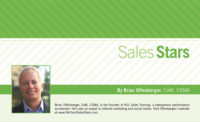Bouncing Back After a Security Sales Loss

Losing a deal. One hurts a little; but losing a string of deals in a row, or losing a big one, can be depressing. Even the strongest salespeople and sales leaders can be drained of energy and optimism. Sales teams can weaken. People can get fired.
Losing can and does happen to all of us. So how do you recover, how do you bounce back from a string of failures?
Here’s a tip: Don’t fake it. You can’t hide your disappointment from your boss or team — they already know. And you can’t hide it from yourself. That could only make things worse.
Instead, take some time to process your thoughts and emotions, and then move ahead as an even better salesperson or sales leader.
“You were born to be a player. You were meant to be here. This moment is yours,” said the famous Herb Brooks, U.S. Olympic hockey coach.
Here are some tactics for recovering from significant losses:
Acknowledge your feelings. Good therapists teach that allowing your feelings to be present and acknowledged is a big step toward them going away. Disappointment, anger, sadness, depression and fear are normal feelings that accompany significant losses in selling. Feel them and then release them.
Be kind to yourself. Sometimes you can do all the right things and still have the wrong outcomes. There could be many reasons why losses are not your fault. Bad karma, ridiculous competition, or market conditions might be behind the issue. And remember, if you feel badly about losses, that’s normal. Welcome to the world of sales.
Admit mistakes. Sometimes you screw up, or things don’t go quite the way you’d planned. What were your mistakes? Know what they were, understand why they happened, and determine ways to avoid them in the future. A champion learns from their defeats.
Relax. Time off can help you rejuvenate and bounce back. Take a weekend getaway or even a staycation at a local resort. Some quiet downtime can get you back on track. Is a short getaway impossible? Then try stress relievers such as meditation or yoga.
Get some exercise. Exercise has shown to be effective in lessening depression or those “down in the dumps” feelings we get from losing. It’s also a great way to alleviate the stress caused by the emotions associated with losing. Walk, hike, run, swim. Do something active outdoors to work up a sweat.
Get adequate sleep. Sure, this can be hard to do when we’re worried about paying the bills or closing a deal so the boss continues to pay us. But you must try. Take catnaps, pause and rest in quiet places when you can, and practice lifestyle habits that are conducive to good sleep. Eventually, and maybe with a little effort, good sleep can return.
Talk to someone. You can learn from a spouse, a peer, a friend, a mentor or maybe even another salesperson or business leader who has experienced losses. Trust that the future will be brighter. I know of a rep who lost a $14 million deal. He got help from a professional therapist and now earns more than $300,000 a year.
Don’t abuse. The answer to your feelings isn’t at the bottom of a bottle of alcohol. Avoid drowning your feelings or stuffing your face full of goodies or other mood-altering substances. Nothing wrong with a drink — just don’t let things get out of hand.
Join the club — Abraham Lincoln, Michael Jordan, Steve Jobs. They all failed miserably at some point in their lives, only to rebound and accomplish some spectacular things. Lincoln was fired from a job, defeated for the state legislature, had a sweetheart die, suffered a nervous breakdown, lost a senate race and became known as one of our greatest presidents ever. Good work, Abe!
Sure, losing sucks, especially a string of losses. But strong salespeople and strong sales leaders acknowledge their feelings around losses. They use appropriate ways of dealing with their feelings and learn from their losses. Best of all, they use losses to fuel the growth necessary to soar to even bigger victories. Don’t be afraid of losing. Rather, be afraid of all you might miss by fearing to attempt.
Looking for a reprint of this article?
From high-res PDFs to custom plaques, order your copy today!








